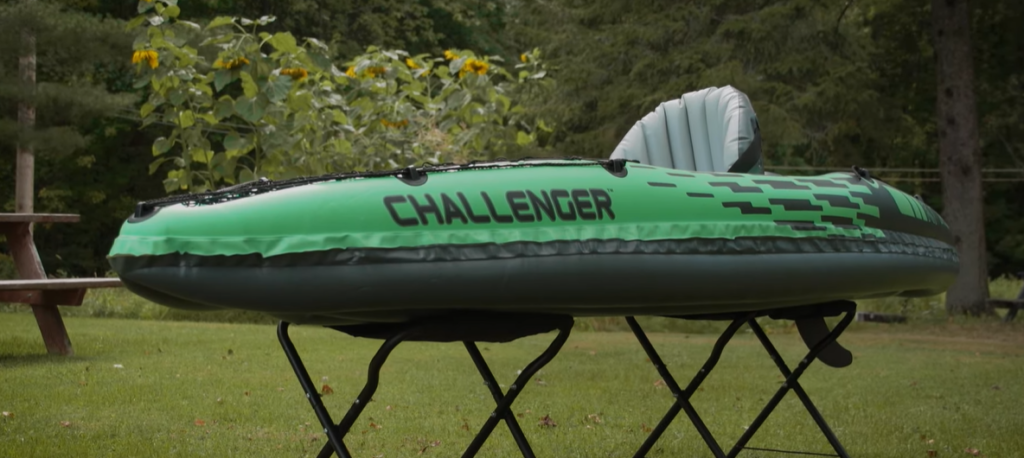If you love kayaking, you might have considered getting an inflatable kayak for its convenience and portability. But before you hit the water, you need to know if your inflatable kayak needs to be registered or not.
So, Do inflatable kayaks need to be registered? The simple answer is that it depends on local laws and regulations. In some areas, yes, inflatable kayaks do need to be registered while in others they don’t.
Curious about the specifics? Stick around as we navigate through this topic. By the end of this read, you’ll have a clear understanding of when, where and why registration might be necessary for your inflatable kayak. Let’s paddle forward!

which States Require Registration For inflatable kayaks
| State | Registration Required | Conditions | Exceptions |
|---|---|---|---|
| Alabama | Yes | All motorized boats | Non-motorized boats |
| Alaska | No | None | All boats |
| Arizona | Yes | All motorized boats and sailboats over 8 ft long | Non-motorized boats under 8 ft long |
| Arkansas | Yes | All motorized boats | Non-motorized boats |
| California | Yes | All motorized boats and sailboats over 8 ft long | Non-motorized boats under 8 ft long |
| Colorado | Yes | All motorized boats and sailboats over 8 ft long | Non-motorized boats under 8 ft long |
| Connecticut | Yes | All motorized boats and sailboats over 19.5 ft long | Non-motorized boats under 19.5 ft long |
| Delaware | Yes | All boats | None |
| Florida | Yes | All motorized boats | Non-motorized boats |
| Georgia | Yes | All motorized boats | Non-motorized boats |
| Hawaii | Yes | All motorized boats and sailboats over 8 ft long | Non-motorized boats under 8 ft long |
| Idaho | Yes | All motorized boats | Non-motorized boats |
| Illinois | Yes | All boats | None |
| Indiana | Yes | All motorized boats | Non-motorized boats |
| Iowa | Yes | All boats over 7 ft long | Boats under 7 ft long |
| Kansas | Yes | All motorized boats | Non-motorized boats |
| Kentucky | Yes | All motorized boats | Non-motorized boats |
| Louisiana | Yes | All motorized boats | Non-motorized boats |
| Maine | Yes | All motorized boats | Non-motorized boats |
| Maryland | Yes | All motorized boats and sailboats over 16 ft long | Non-motorized boats under 16 ft long |
| Massachusetts | Yes | All motorized boats | Non-motorized boats |
| Michigan | Yes | All motorized boats | Non-motorized boats |
| Minnesota | Yes | All motorized boats and boats over 10 ft long | Non-motorized boats under 10 ft long |
| Mississippi | Yes | All motorized boats | Non-motorized boats |
| Missouri | Yes | All motorized boats | Non-motorized boats |
| Montana | Yes | All motorized boats | Non-motorized boats |
| Nebraska | Yes | All motorized boats | Non-motorized boats |
| Nevada | Yes | All motorized boats | Non-motorized boats |
| New Hampshire | Yes | All motorized boats | Non-motorized boats |
| New Jersey | Yes | All motorized boats | Non-motorized boats |
| New Mexico | Yes | All motorized boats | Non-motorized boats |
| New York | Yes | All motorized boats | Non-motorized boats |
| North Carolina | Yes | All motorized boats | Non-motorized boats |
| North Dakota | Yes | All motorized boats | Non-motorized boats |
| Ohio | Yes | All boats | None |
| Oklahoma | Yes | All motorized boats | Non-motorized boats |
| Oregon | Yes | All motorized boats and boats over 10 ft long | Non-motorized boats under 10 ft long |
| Pennsylvania | Yes | All motorized boats and boats used on state parks or forests | Non-motorized boats used on private waters |
| Rhode Island | Yes | All motorized boats | Non-motorized boats |
| South Carolina | Yes | All motorized boats | Non-motorized boats |
| South Dakota | Yes | All motorized boats | Non-motorized boats |
| Tennessee | Yes | All motorized boats | Non-motorized boats |
| Texas | Yes | All motorized boats | Non-motorized boats |
| Utah | Yes | All motorized boats | Non-motorized boats |
| Vermont | Yes | All motorized boats | Non-motorized boats |
| Virginia | Yes | All motorized boats | Non-motorized boats |
| Washington | Yes | All motorized boats | Non-motorized boats |
| West Virginia | Yes | All motorized boats | Non-motorized boats |
| Wisconsin | Yes | All motorized boats and sailboats over 12 ft long | Non-motorized boats under 12 ft long |
| Wyoming | Yes | All motorized boats | Non-motorized boats |
Requirements for Registering a inflatable Watercraft

Registering a watercraft is an essential step in becoming a boat owner. This process involves various legal requirements that you need to fulfill before you can hit the waters. Adhering to these stipulations will ensure your boating experience remains worry-free and within the law.
So, what are these requirements? Let’s dig deeper into them.
Proof of Ownership
First and foremost, proof of ownership is paramount when registering a watercraft. You must present either the manufacturer’s certificate of origin (MCO) or the bill of sale as evidence. In some cases, both might be required depending on your state’s regulations.
Title Application Form
A completed title application form is another requirement for registering your watercraft. The specifics of this form may vary from one jurisdiction to another but generally include information such as your name, address, and details about the boat itself.
Payment for Registration Fees
You also need to pay registration fees at the time of applying for boat registration. The cost will depend on factors like your location and the size or type of your vessel.
Safety Equipment Compliance
To register a watercraft in many jurisdictions, proving compliance with safety equipment standards is mandatory. The necessary gear includes life jackets, fire extinguishers, visual distress signals among others.
The following aspects may help you understand more about each requirement:
- MCO or Bill of Sale: These documents establish that you legally own the boat.
- Title Application Form: A key document providing personal details and information about your vessel.
- Fees: Vary based on location and type/size of watercraft.
- Safety Equipment: Ensures your boat is equipped for emergencies and safety situations.
Do Inflatable Kayaks Fall Under Registration Laws?
In most cases, the need for registration often revolves around whether or not a motor is attached to the kayak. Many states only require watercraft with motors to be registered, regardless of their size. Thus, if you’re paddling an inflatable kayak without a motor, you’ll likely fall outside of this requirement.
However, it’s always wise to check with your local Department of Motor Vehicles (DMV) or equivalent agency to understand precisely what rules apply in your area.
Motors and Registration
As mentioned earlier, typically boats that are equipped with motors need registering – whether they’re inflatable kayaks or not. If you plan on adding an engine to your kayak, expect to go through the vessel registration process.
Fishing Licenses and Regulations
Another aspect that might affect your inflatable kayak use is fishing regulation if you plan on using it for angling purposes. Fishing often requires its own set of licenses and permits; hence make sure you’re familiar with these before heading out.
Safety Equipment Requirements
Regardless of registration laws, safety should always be paramount when taking any boat out on the water – including an inflatable kayak. Ensure that you have all required safety gear onboard as stipulated by Coast Guard regulations like life jackets and signaling devices.
The following aspects may help you
Familiarize yourself with local boating laws; Check whether there are any restrictions concerning non-motorized vessels; Understand fishing license requirements if you plan to fish.
Factors Influencing the Need to Register Your Inflatable Kayak

The process of registering your inflatable kayak might seem like an unnecessary hassle, but there are several factors that make it a wise decision. These factors range from legal requirements, insurance benefits, and even the potential for resale value. Here’s why you should consider registering your inflatable kayak.
Legal Requirements
The first and foremost reason is tied to legal obligations. Depending on where you live or plan to paddle, some jurisdictions require any watercraft, including inflatable kayaks, to be registered – regardless of their size or motorization status.
Insurance Benefits
Registering your kayak can also have implications when it comes to insurance coverage. Should any damage occur while out on the water or during transportation, having a registered kayak could potentially influence claim success with certain insurance providers.
Potential for Resale Value
A registered kayak may hold more appeal if you ever decide to sell it in the future. Prospective buyers often view registration as proof of ownership and legitimacy which may increase its resale value.
Moving forward now into deeper aspects influencing this need for registration.
Safety Measures
In case of emergencies or accidents while kayaking, having a registered vessel simplifies identification by authorities aiding in search and rescue operations.
Towards Responsible Kayaking Practices
Last but not least, registering your inflatable kayak promotes responsible usage practices among paddling communities across the globe. It fosters accountability towards abiding by local regulations and guidelines ensuring safety for all users involved.
Steps to Register Your Inflatable Kayak
Registering your inflatable kayak is an essential step for legal and safety reasons. The process may vary slightly depending on the locality, but generally involves a similar set of steps. This process ensures that you can enjoy worry-free kayaking adventures.
Let’s dig deeper into the detailed procedure of getting your inflatable kayak registered.
Step 1: Gather Necessary Documents
The first step in registering your inflatable kayak is gathering all necessary documents. These typically include proof of ownership, bill of sale, and identification information. Make sure all these documents are accurate and up-to-date before proceeding further.
Step 2: Complete Application Form
The next step involves completing an application form provided by local marine or boating authority. Fill out this form with relevant details about the kayak such as make, model, year, hull identification number (HIN), etc., along with personal information like name and address.
Step 3: Pay Registration Fee
You’ll need to pay a registration fee which varies based on location and type of vessel. Consult local authorities or their website for specific fees applicable in your area.
Step 4: Submit Application
The final step is submitting the completed application along with payment receipt and required documents to appropriate authority either online or through mail depending on available options.
Moving forward from here let’s find out some additional aspects that might help during this process:
- Paddle Smart Identification Stickers: Some states require kayaks to have Paddle Smart Identification stickers attached for safety purposes. Check if it’s mandatory in your region.
- Kayak Registration Renewal: Kayak registrations are usually valid for 1-3 years. Hence, remember to renew it before the expiration date to avoid penalties.
- Transfer of Ownership: In case you sell your kayak in future, notify the local authority about change in ownership to update records.
FAQs
Is it mandatory to register an inflatable kayak?
No, most states in the U.S do not require registration for non-motorized vessels like inflatable kayaks. However, local laws may vary so it’s best to check with your local authorities.
Does my inflatable kayak need a license plate if I use a motor on it?
Yes, if you attach a motor to your inflatable kayak, many jurisdictions will require you to register the vessel and display registration numbers or a license plate.
Are there any penalties for not registering an inflatable kayak when required?
Yes, failure to register a motorized inflatable kayak where required could result in fines or other penalties. The specific consequences vary depending on local regulations.
Do rules about registering boats apply equally to all types of kayaks?
Generally speaking, no – non-motorized vessels including most types of kayaks are often exempt from registration requirements. But once again these rules can vary by state or country so always check locally.
